Get Ready for Back to School with CommUnityCare Health Centers
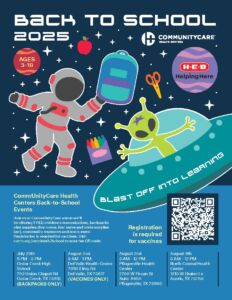 In honor of National Health Center Week, CommUnityCare Health Centers is excited to host Back to School events to prepare Central Texas children for the upcoming school year! Event details vary. See below.
In honor of National Health Center Week, CommUnityCare Health Centers is excited to host Back to School events to prepare Central Texas children for the upcoming school year! Event details vary. See below.
National Health Center Week (August 3-9, 2025) serves as an opportunity to showcase the dedication and efforts of Community Health Centers nationwide that diligently work to enhance health outcomes and reduce health disparities. This year’s National Health Center Week theme focuses on the past, present and future – and celebrating 60 years of our nation’s health.
As part of this year’s celebration, CommUnityCare is proud to launch a new partnership with Bastrop Independent School District to expand access to school supplies, health screenings, and essential services for families in the region.
“Bastrop ISD is thrilled to be partnering with CommUnityCare Health Centers for our 2025 Back to School Bash,” said Karen Trevino, Bastrop ISD Director of Community Relations. “Each year, the Back to School Bash brings school supplies and valuable resources to Bastrop and surrounding communities. Now CommUnityCare will be taking it to the next level, distributing over 900 stuffed backpacks and providing families with eligibility screenings and the opportunity to sign up for free vaccinations at their Del Valle Health Center. Having this information available at our event will undoubtedly make it easier for students to get everything they need to prepare for a healthy and successful school year.”
Back to School Events:
Where: Cedar Creek High School | 793 Union Chapel Rd
When: Tuesday, July 29 | 5 p.m. – 8 p.m.
What: CommUnityCare Health Centers will be offering FREE backpacks and school supplies for the Bastrop community and surrounding areas at Cedar Creek High School. Backpacks/supplies are FIRST COME, FIRST SERVE until supplies last. Financial screening appointments will also be available. Plan ahead and register for a financial screening appointment at the event: https://cuctx.org/FSback2school
Where: Del Valle Health and Wellness Center
When: Saturday, August 2 | 8 a.m. – 1 p.m.
What: CommUnityCare Health Centers will be offering FREE children’s immunizations. An appointment is REQUIRED: http://cuctx.org/vaccinesb2school
Where: Pflugerville Health Center
When: Saturday, August 2 | 8 a.m. – 12 p.m.
What: CommUnityCare Health Centers will offer FREE children’s immunizations. An appointment is REQUIRED for immunizations: http://cuctx.org/vaccinesb2school. Patients will receive first-priority for free backpacks and supplies, but walk-ins are welcome while supplies last. Supplies are very limited.
Where: North Central Health Center
When: Saturday, August 9 | 8 a.m. – 12 p.m.
What: CommUnityCare Health Centers will offer FREE children’s immunizations, backpacks, school supplies, community resources, plus more! Backpacks/supplies are FIRST COME, FIRST SERVE until supplies last. An appointment is REQUIRED for immunizations: http://cuctx.org/vaccinesb2school.

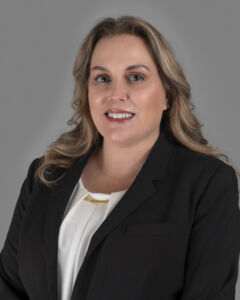 CommUnityCare Health Centers is excited to announce Cristie Pellegrini has been promoted to Chief Pharmacy Officer, where she will lead the strategic, clinical, financial, and operational oversight of the organization’s pharmacy services.
CommUnityCare Health Centers is excited to announce Cristie Pellegrini has been promoted to Chief Pharmacy Officer, where she will lead the strategic, clinical, financial, and operational oversight of the organization’s pharmacy services. Austin, TX — The CommUnityCare Board of Directors has appointed Dr. Nicholas Yagoda as permanent Chief Executive Officer (CEO), elevating him from the interim position he has held since September 2024.
Austin, TX — The CommUnityCare Board of Directors has appointed Dr. Nicholas Yagoda as permanent Chief Executive Officer (CEO), elevating him from the interim position he has held since September 2024.

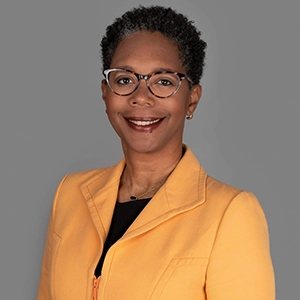 To ensure continuity and stability during this transition,
To ensure continuity and stability during this transition,  Asad Asghar
Asad Asghar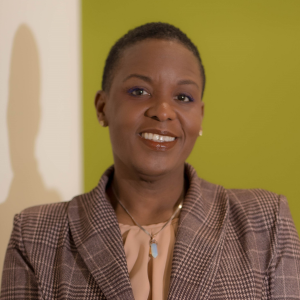 October Ambrose
October Ambrose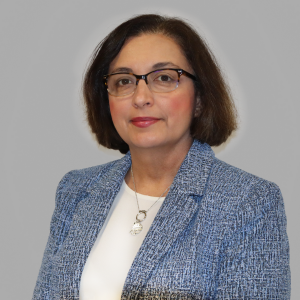 Dr. Rosa De La Torre
Dr. Rosa De La Torre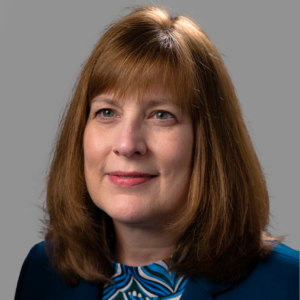 Dr. Susan Dubois
Dr. Susan Dubois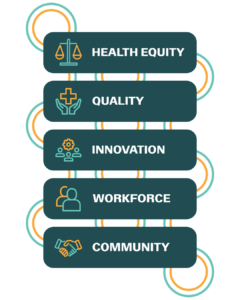
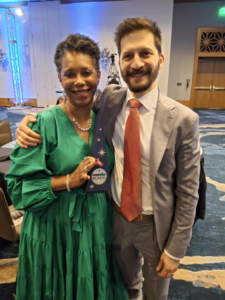
 CommUnityCare Health Centers is excited to begin services at the new Central Health
CommUnityCare Health Centers is excited to begin services at the new Central Health